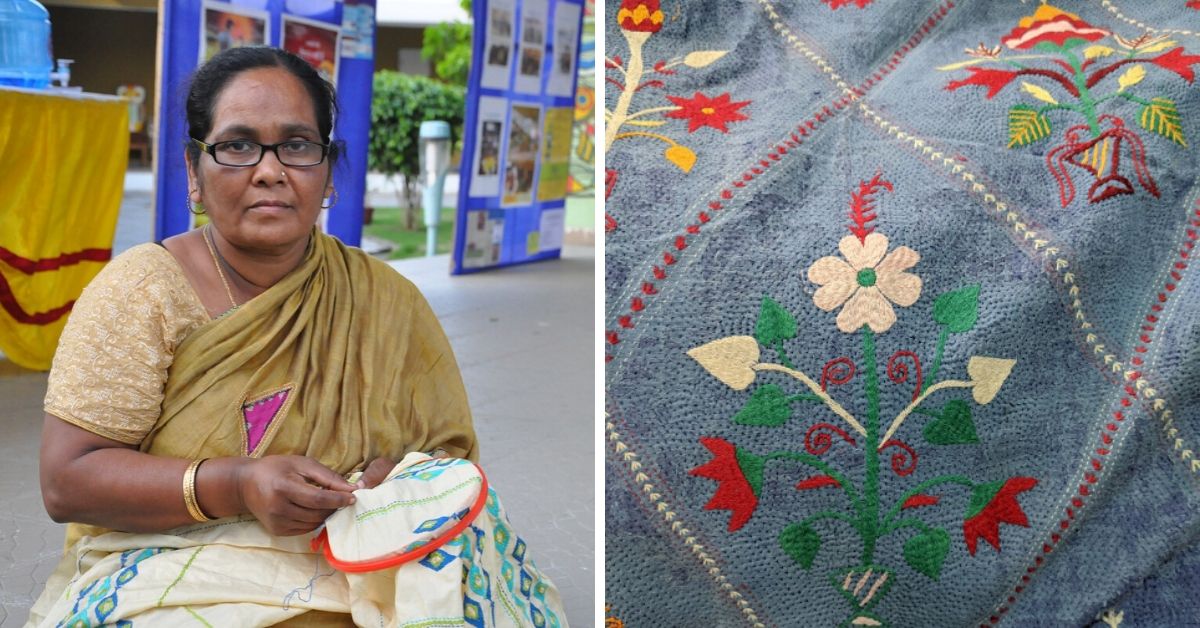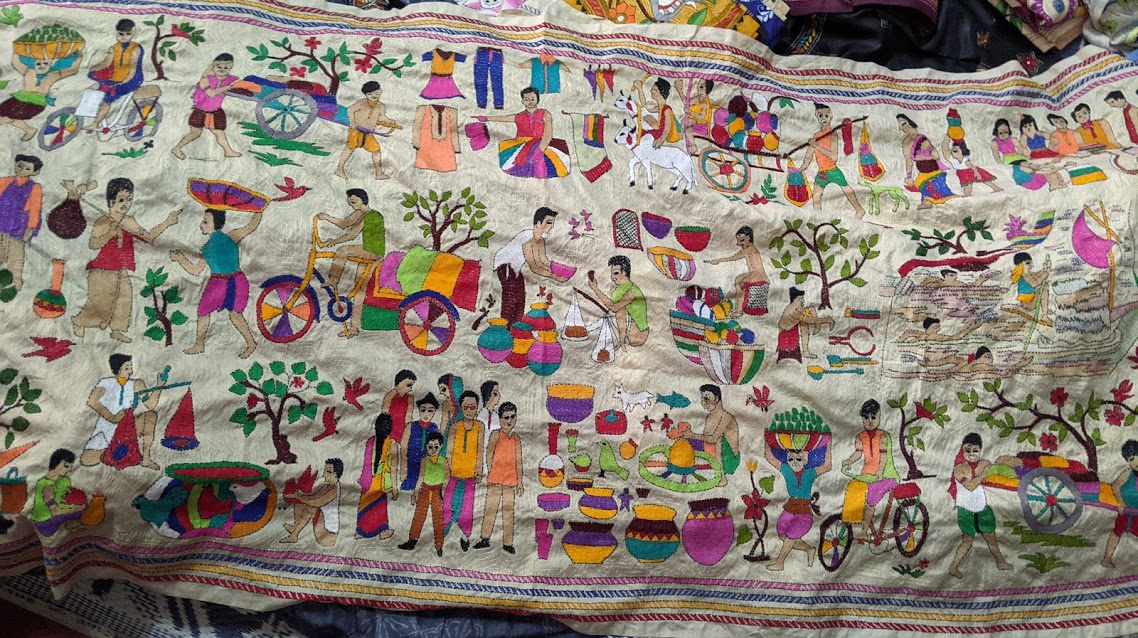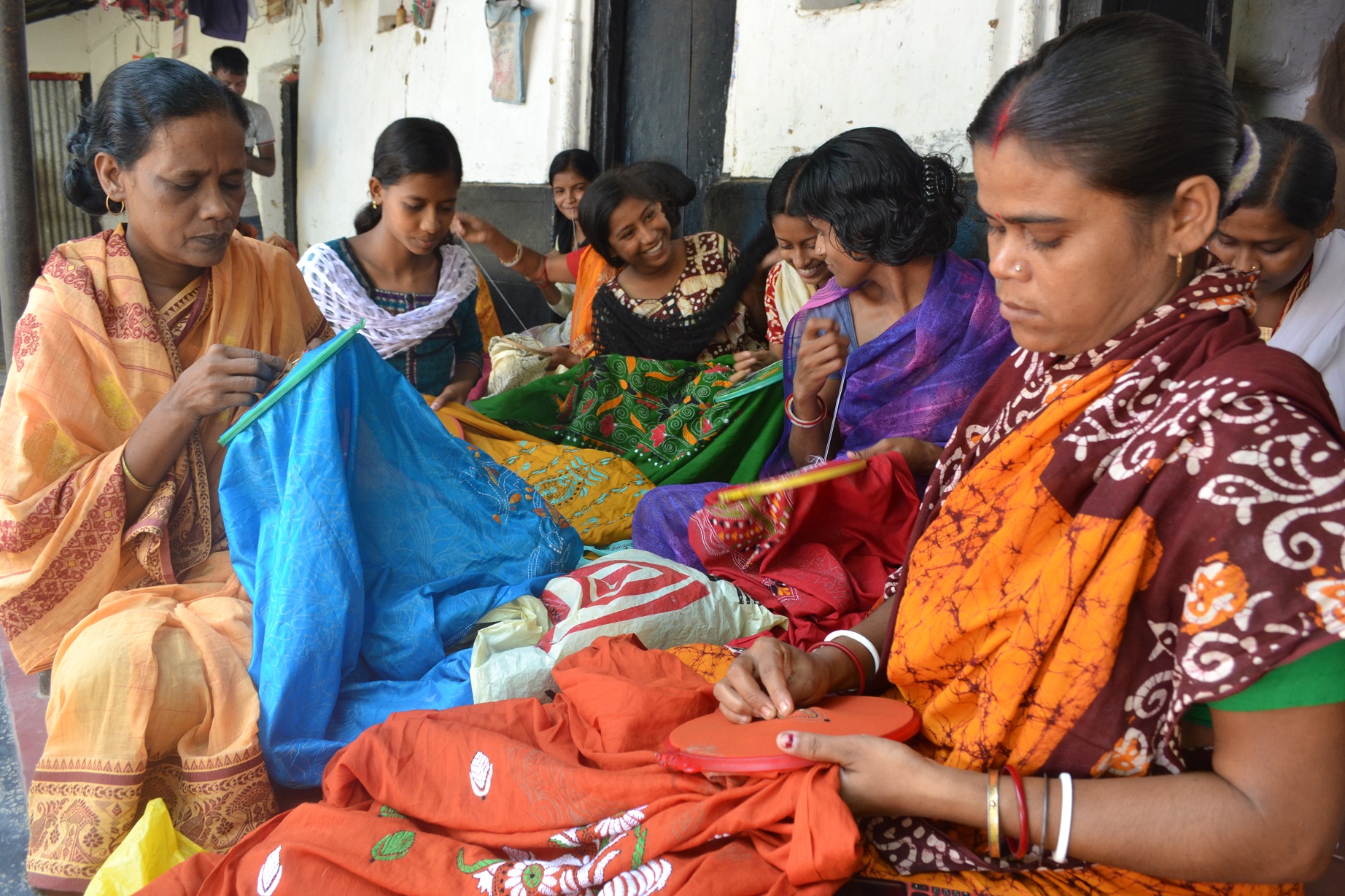How One Woman Used The Art of Turning Rags to Quilts to Empower 600 Others
“My income at the time was Rs 15-20 per day, and even that was not regular. On many days, I would just eat puffed rice as I could not afford a lunch-meal for myself.”

With The Positive Collective, The Better India’s COVID-19 coverage is available to regional language publications for free. Write to [email protected] for more details.
Nanoor, in the Birbhum district of West Bengal, used to be an ordinary village, with most families socially marginalised and living below the poverty line. Led by the women of the village who showed the courage to join a support programme run by an NGO, Banglanatak dot com, it has undergone a sea change over the last decade.
A large section of the population belongs to other backward communities, mainly engaged in daily labour. The women here traditionally stitched kantha (a type of quilt stitched by joining fabric scraps, for covering oneself or children).
Today, the fashion world may have different names and applications for it, but in our childhood, we have all had hand-made kanthas in our homes, using torn and old sarees of our mothers and grandmothers, by the rural service providers.
To make ends meet, a few of Nanoor’s women used to stitch kanthas for sellers and customers in nearby towns. One of them was Tajkira Begum, who toiled to support her children and family, managing both her household and work outside the village.
Using her kantha stitching skills, she would bring orders from various sellers in Bolpur town and deliver the finished goods. She would often walk to work as she could not afford bus fare. Her husband did not have any stable source of income either.
While she was away for the day, leaving her four children and old mother at home, her eldest daughter would take care of everyone, even at the age of eleven.
She says, “My income at the time was Rs 15-20 per day, and even that was not regular. On many days, I would just eat puffed rice as I could not afford a lunch-meal for myself.”
Once Tajkira returned, she would cook, feed her family, finish her work, and finally take some rest to be ready to fight the next day.

Her free mobility was not acceptable to many villagers, who questioned her dignity and intentions. Despite such hindrances, Tajkira knew that she was special, and her strength held her family together. Her husband, who supported her work, did not do so from any sense of power or control. Rather, he showed partnership and companionship by understanding her, appreciating her, being by her side, and boosting her energy whenever she felt hopeless.
Tajkira emphasises that she was lucky. She says, “I could pursue what I wanted to only because my family supported me. My daughter helped me. Sometimes when I felt low and lost hope, my husband encouraged me. That kept me going.”
When she got the opportunity to pursue her skills more seriously, with support from the NGO, she grabbed it and did not turn back. Initially, she trained in diversified products and business intelligence; then, she started teaching some women who joined her.
Together, they formed several self-help groups. Tajkira, the entrepreneur of this group, brought orders from diverse markets and customers and distributed the work to more women in her village to generate a direct source of income for them, thus strengthening their collective.
In Tajkira’s words, this was like a dream come true in a village where women were previously confined to their homes and had no steady source of independent income. Hardly any girl children from the village went to school, and boys’ attendance was also sparse. However, the small steps taken by these women to change their lives led to a sea change in the community.
Soon, about 300 women joined Tajkira. She developed a strategy for distributing work based on their skills, need for money, motivation and interest, and sense of responsibility and accountability. She also ensured that all payments were made on time, even when client payments were delayed.

They made embroidered products as per orders, which included kantha, fabric for apparel, saris, and wall hangings. Many of these women earned a meagre Rs 80-100 over a month, or nothing at all. After joining Tajkira, and being trained on the job, they started earning about Rs 400-500 per month.
For making such timely payments, she sometimes had to pawn whatever little ornaments she had. She let go of her profit margins to help these women earn more. She realised that timely payment was essential to motivate and sustain the engagement of these women, which in turn was fundamental to their collective survival.
Tajkira also passed on what she learnt from her training and interactions with customers to those who showed entrepreneurial flair. Under her leadership, other women entrepreneurs started emerging, gradually expanding the work in the village. They understood that ‘togetherness’, ‘collaboration’, and ‘mutual support’ are the ways to rise above their marginalisation.
Recently, I had a chance to talk to Tajkira, and learn more about her journey. She recalled the time she visited Kolkata for the first time, to participate in an exhibition. She said, “It was like a fantasy. Never before had I gone out of Bolpur,” (the subdivision of her village), and the thought of boarding a train made her scared, anxious, and nervous.
However, there was no stopping her after that first visit, and today, she comfortably travels across the world – to Germany, France, USA, Denmark, etc – and communicates with foreigners through her craft. Boarding her first flight to Germany was a moment of achievement. During these visits, she sells her products in exhibitions and festivals, and also provides kantha training in local schools and art institutions.
She learned to enjoy her own life, drawing inspiration from the women she met and their friendships, and says, “I saw women much older than me working hard while also enjoying life. I thought, ‘I am much younger, so why should I lose hope for the future?’ I was inspired by them.”

In our conversation about her international trips, she mentions Paris as a city she really liked.
Recalling her experiences, she says, “All of us from India attending the event in Paris stayed together in an apartment. We cooked together and had a nice time. I also found that people in those countries do their own work, something I really liked. I also liked that they do not lie. There is no dishonesty in their daily lives. We stayed there for 23 days, travelling in and around Paris. I was often invited at the homes of my new friends and they all referred to me as their Indian teacher. I have never felt so proud and respected before!”
These trips made her more confident and it became her mission to contribute to the well-being of her fellow workers and women. The network she built through these visits helped her get directly linked with international buyers, who became loyal customers through WhatsApp. Her personality and skill attracted many, and through word of mouth, her clientele expanded.
Today, she is a brand in herself.
I asked her how many women she works with, expecting the number to have increased from three hundred. In a satisfied tone, she replied that it was hundred. I was taken aback but soon realised that of the 300 wage labourers, 100 had become small entrepreneurs and emerging leaders who worked with Tajkira.
Today, 600 women are engaged in paid work in their traditional skill of kantha. The wage artisans, who used to earn not more than Rs 500 per month previously, are now earning approximately Rs 2,500-Rs 5,000. Small women entrepreneurs earn between Rs 12,000-Rs 15,000 per month.
And Tajkira herself is a symbol of success and determination.
A few other women who joined our conversation enthusiastically stated that they felt confident as independent earning members of their families, ensuring good lives for their children. One of them says, “As a single mother, it was very difficult for me to support my children’s education and make a living in a closed society. Working with Tajkira-di has helped me earn a decent livelihood, and has also given me confidence to lead life in my way.”
A younger woman says, “Now I can buy the things I want without depending on my husband. I also have a voice in the family.”
Tajkira’s daughter-in-law, who presently looks into the operations of her enterprise, expressed immense gratitude for her mother-in-law. Excitedly, she shares how much she enjoys freely developing new designs and creative ideas, “I get inspiration to create new designs from whatever I see around me, in newspapers or magazines. I am often bored stitching the same patterns, which is an essential part of kantha work. So I often distribute that work to other women, and focus on design innovations to create samples, which we then show to our clients.”
Tajkira, however, does not consider the business as her success. Her satisfaction lies in what she has been able to give to her village. She has donated land worth three lakh rupees to a local Madrassa. She has been able to get most of the girl children to attend school. A village where only a few had completed secondary education, and no one thought of higher studies, today has almost twenty women who have completed their Masters. They now see education as a necessity, not an option.
Tajkira’s pride is in her band of economically and socially empowered women, the prestige and dignity that they have achieved, the trust she has been able to build, and the awards that some of them have received. She also shyly confides that her husband is so proud of her that he goes around telling others that no one can become like her!
Also Read: What About Weavers? How India’s 2nd Largest Employment Sector Is Dealing with COVID-19
Expressing her sense of fulfillment and happiness, she says, “My next goal is to go out and help train marginalised women in other villages, districts and distant places. I want to spread my knowledge to empower other women.”
She shares a memory which she uses to symbolise aspiration, which is a driver of self-development. During her initial days of struggle, on a hot summer afternoon, she felt like having ice cream but did not have any money. Now, whenever training sessions are organised in her house, she treats everyone with ice cream on the final day!
Amidst all the success, she has not lost her focus and empathy. Her goal is to bring more women to the frontline. She concludes, “I pursue business not only for my home but to pull up other exploited women.”
(Written by Madhura Dutta and Edited by Shruti Singhal)
Like this story? Or have something to share?
Write to us: [email protected]
Connect with us on Facebook and Twitter.
If you found our stories insightful, informative, or even just enjoyable, we invite you to consider making a voluntary payment to support the work we do at The Better India. Your contribution helps us continue producing quality content that educates, inspires, and drives positive change.
Choose one of the payment options below for your contribution-
By paying for the stories you value, you directly contribute to sustaining our efforts focused on making a difference in the world. Together, let’s ensure that impactful stories continue to be told and shared, enriching lives and communities alike.
Thank you for your support. Here are some frequently asked questions you might find helpful to know why you are contributing?


This story made me
-
97
-
121
-
89
-
167











